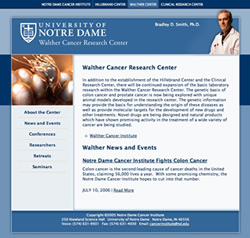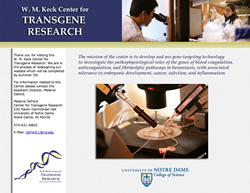Cancer

Cancer is a leading cause of death worldwide. From a total of 58 million deaths worldwide in 2005, cancer accounts for 7.6 million (or 13%). More than 70% of all cancer deaths in 2005 occurred in low and middle-income countries.
While the treatment of cancer has improved dramatically over the past ten years, the long-term elimination of this disease will be accomplished through continued education and research. Notre Dame researchers are:
- Looking for an effective agent for treating cancer, with help for patients in chemotherapy
- Taking the genetic analysis of tumors to a whole new level
- Improving testing and "personalized" treatment of cancer
- Looking for the key to colon cancer
Since 1998, cancer research in the Walther Cancer Research Center has grown significantly and now comprises the activities of 30 faculty members and 20 postdoctoral fellows focusing on many areas of cancer research.
Funding: Walther Cancer Research Center will proceed with $700K to recruit new investigators specializing in cellular oncology and the design of anticancer drugs.
"We are beginning to understand what happens during this whole transition when epithelial cells change phenotype and acquire more motile characteristics. If we can prevent tumor cells from metastasizing, that would be phenomenal." -Crislyn D’Souza-Schorey, Associate Professor, Walther Cancer Institute Chair
W.M. Keck Center for Transgene Research Puts ND at the Forefront of Cancer Research

Founded mid- to late 90s, the Center thrust ND into national prominence as a premier player in several fields within the genetics of molecular medicine, including cancer.
"The day is going to come where every cancer is going to be profiled for its genetic composition." –Francis J. Castellino, The Kleiderer/Pezold Professor of Biochemistry and Director of the Keck Center for Transgene Research
Both the Walther Cancer Research Center and the Keck Center operate within the Dept. of Chemistry and Biochemistry. The arrangement of research in interdisciplinary fields has produced a special niche worldwide for the College of Science.
- Uncovering how cancers form, developing new therapeutic and diagnostic strategies for Huntington’s Disease
- Nanotechnology, nanobiotechnology: Improving a physician’s ability to design a treatment regime or track a patient’s progress, with applications to environmental remediation and disease diagnosis and treatment.
- Prostate and breast cancer research
- Genetic basis of colon cancer
- Probing the underlying genetics of sepsis, the leading cause of death in hospital trauma units
"We’ve developed a variety of particles. We believe they could prove to be useful mobile sensors, perhaps even tracking cancer in the body." -Agnes E. Ostafin, Assistant Professor, Dept. of Chemical and Biomolecular Engineering
The Role of the Jordan Hall of Science

A cutting-edge facility to forge 21st century solutions to the global health crisis. This year’s Forum coincides with the opening of our new Jordan Hall of Science... > Read More
News & Events
11.22.2006
World AIDS Week
In commemoration of World AIDS Day on December 1st, the World AIDS Day task force sponosred by the CSC will be hosting a week of events that focus on increasing awareness for HIV/AIDS among Notre Dame students and faculty.
